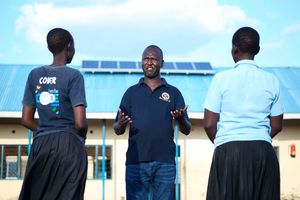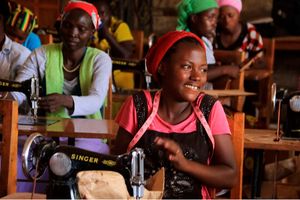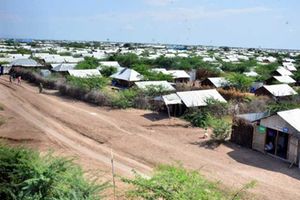
A newly registered Somali refugee supports herself on a chain-link perimeter fence at Dadaab camp on July 23, 2011.
Kenya has never created a database of the close to a million refugees it has hosted over the last quarter a century.
Instead, Nairobi has been making strategic and operational decisions on the foreigners using data provided by third parties, including the United Nations High Commissioner for Refugees (UNHCR).
The revelations were made during a high-level forum on refugee affairs organised by the National Assembly's Regional Development Committee in Mombasa.
"The country's current refugee database is managed by the UNHCR, with data stored in Hungary, in Europe,” said Mr John Burugu, the Commissioner for Refugee Affairs who spoke at the forum.
“We are supposed to be the custodians of this database and while we are involved in processing it, we do so as data processors for a third-party organisation. However, I want to assure the National Assembly that we are working with partners to develop a more accurate and localized refugee database for Kenya.”
Also Read: Day I saw terror in eyes of Turkish abductee
Kenya has six gazetted refugee camps: Kakuma in Turkana County, and five others in Dadaab and Fafi constituencies of Garissa County— IFO 1, IFO 2, Kabiyos, Dagahaley, and Hagadera.
The revelation by Mr Burugu suggests that the Interior ministry does not know the exact number of refugees in the country, and those Kenya has hosted in the past.
Mr Burugu revealed the uncertainty surrounding the accuracy of refugee numbers reported by the UNHCR.
“We cannot fully confirm that the numbers we receive from the UNHCR represent the actual refugee population in Kenya,” he stated.
For 30 years, Kenya has hosted more than 750,000 refugees from Somalia, South Sudan, the Democratic Republic of Congo(DRC) and Burundi, according to UNHCR records.
Also Read: NGO backs out-of-camp policy for refugees
The forum convened by Sigor MP Peter Lochakapong, the Chairperson of the Regional Development Committee, gathered key stakeholders involved in refugee affairs to address challenges in the sector.
Survey
It followed the committee’s two-week fact-finding mission at Kakuma and Dadaab refugee camps, during which the MPs assessed the conditions of refugees, engaged with local stakeholders, and met with host communities to inform a report that will be presented to Parliament.
The lawmaker expressed concern that Kenya had not conducted a comprehensive environmental, social, and political impact assessment despite hosting refugees for over 30 years.
“Concerns raised by host communities include land disputes, environmental degradation, insecurity, lack of public participation in integration efforts and the underfunding of the Department for Refugee Services,” said Mr Lochakapong.
“There’s also increasing resource competition between refugees and host communities.”
During the visit, the committee noted that security challenges at the porous Kenya-Somalia border are a key factor driving the ongoing influx of refugees into Kenya.
Also Read: The growing reality of climate refugees
During their visit to Garissa, the parliamentary committee was shocked to learn that many refugees from neighboring Somalia view Kenya’s Dadaab refugee camps as a "land of milk and honey."
Lured by stories of better opportunities from relatives already registered in the camps, the committee established that many refugees have been making their way to Dadaab, often bribing rogue security personnel at the porous Kenya-Somalia border to gain entry.
Committee Members supported the call for proper implementation of the Refugee Act 2021, with Voi lawmaker Abdi Khamis Chome stressing the need for a clear, written refugee management policy in Kenya.
“We need a well-defined policy that clarifies the roles of all actors involved in refugee affairs, including the inclusion and participation of host communities,” said Mr Chome.
The MPs raised concerns, saying the government has also neglected host communities.
“Why are we focusing so much on defending the rights of refugees while neglecting the host communities? Do we have Kenyan refugees abroad, and if so, do they receive the same level of support that refugees in Kenya receive? We must ensure that host communities receive equal treatment to avoid creating tensions," said Ganze MP Kazungu Tungule.
Garissa Governor Nathif Adam Jama, whose county hosts thousands of refugees called for a comprehensive report that would guide the creation of a national policy on refugee affairs.
“Garissa County has hosted refugees for over 32 years on community land without compensation. We need to address this issue properly,” said Governor Adam.
Governor Jama also highlighted other challenges faced by host communities, including environmental degradation, poaching, disease outbreaks, and the over-exploitation of the Merti Aquifer, which is shared by Kenya and Somalia.
Garissa Township MP Dekow Barrow expressed frustration with what he described as the international community’s neglect of host communities.
“The international community can no longer sustain the refugee camps, and our youth are suffering from lack of jobs. The presence of refugees is stretching our resources further,” said Barrow.

Some of the refugees at the Kitale Transit camp on Monday May 22, 2023. The more than 1,600 refugees being hosted at the congested Kitale ASK Holding Grounds will have to stay longer due to lack of space at Kakuma Refugee camp in Turkana. National Commissioner for Refugees Affairs John Burugu says Kenya is engaging Uganda over the growing number of refugees fleeing the country to Kenya, resulting in the current crisis.
Internal Security Principal Secretary Raymond Omollo, who also attended the forum said the government would embrace coordinated efforts to address the security challenges in refugee zones.
“Managing refugees presents complex challenges that require a multifaceted approach, balancing security, humanitarian needs, and regional cooperation,” Dr Omollo said.
Matungu MP Peter Nabulindo also stressed the need for urgent action to address the refugee situation in the country.
“The government must strike a balance in meeting the socio-economic needs of both refugees and host communities to ensure harmonious co-existence,” said Nabulindo.
Other stakeholders present in the forum included the Ministry of Lands, Public Works, Housing and Urban Development, the Ministry of Interior and National Administration, the State Department for Immigration and Citizen Services, the Refugee Consortium of Kenya, the World Food Program (WFP), and the Kenya National Commission on Human Rights (KNCHR).
The MPs have raised alarm saying the challenges in refugee camps are numerous and need urgent attention.
The committee is expected to produce and present its findings in a report to be considered by the National Assembly.
Statistics indicate that currently, Dadaab refugee camp alone, hosts approximately over 408,000 refugees, while the local population stands slightly over 319,000.
The growing refugee population has now contributed to a reduction in food supplies, leading some refugees to resort to poaching wild animals and cutting down trees to sell firewood and charcoal for survival.
During the fact-finding mission, MPs acknowledged the strain on local resources caused by the large refugee population, which is contributing to environmental degradation and conflicts over resources.
"The host communities feel neglected, and we are committed to addressing these concerns. The refugee numbers need to be reduced to relieve the pressure on local resources," said Maragua MP Mary Wamaua.
It also emerged that the Kenyan government has not provided adequate funding with local security agencies relying heavily on UNHCR support for their operations.
The MPs also want clear agreements be made to ensure fairness in resource distribution.
"We have always welcomed refugees, offering land, water, and hospitality. However, one critical aspect has been overlooked: the formal signing of a memorandum of understanding (MOU) between UNHCR and the government of Kenya," said lawmaker Salah Farah Yakub.







